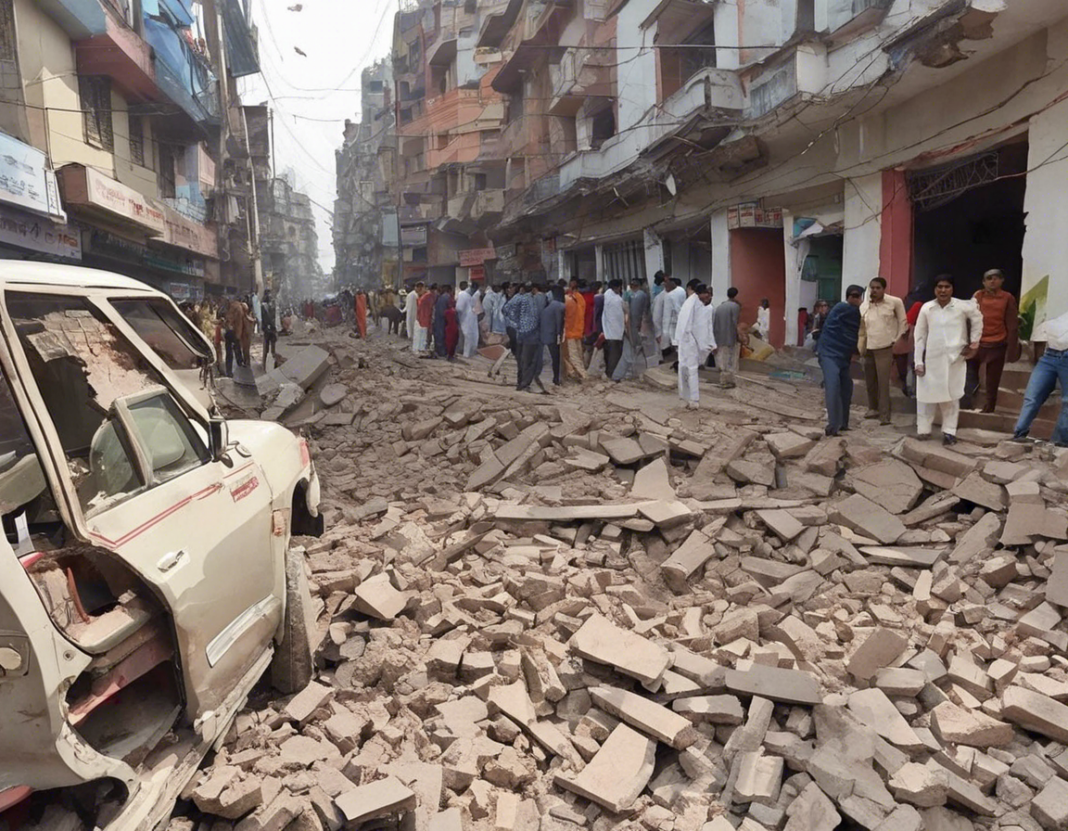In recent news, Patna, the capital city of Bihar in India, was struck by a powerful earthquake, sending shockwaves through the region. The quake, with a magnitude of 6.5 on the Richter scale, caused significant damage to buildings, roads, and infrastructure, and tragically resulted in loss of lives and injuries. The event has once again brought to light the ever-present threat of earthquakes in seismically active regions. In this blog post, we will delve into earthquakes, their causes, effects, and how to stay prepared for such natural disasters.
Understanding Earthquakes
Earthquakes are sudden and violent shaking of the ground, resulting from movements within the Earth’s crust. These movements are primarily caused by the shifting of tectonic plates beneath the Earth’s surface. When these plates rub against each other or collide, immense pressure builds up, which is eventually released in the form of seismic waves, leading to an earthquake.
Causes of Earthquakes
- Tectonic Plate Movements: The primary cause of earthquakes is the movement of tectonic plates. These plates, which float on the semi-fluid asthenosphere beneath them, can move in different directions, leading to seismic activity.
- Volcanic Activity: Earthquakes can also be caused by volcanic eruptions. The movement of magma beneath the Earth’s surface can exert pressure on the crust and trigger earthquakes.
- Human Activities: While less common, human activities such as mining, reservoir-induced seismicity (due to filling of large reservoirs), and underground nuclear tests can also induce earthquakes.
Effects of Earthquakes
Earthquakes can have devastating effects on both the natural environment and human civilization. Some of the common effects include:
– Structural Damage: Buildings, bridges, and roads can be severely damaged or collapse completely.
– Loss of Lives and Injuries: The sudden and destructive nature of earthquakes can result in significant loss of lives and injuries.
– Tsunamis: Underwater earthquakes can trigger tsunamis, massive sea waves that can inundate coastal areas.
– Landslides: Earthquakes can destabilize slopes, leading to landslides that can cause further destruction.
Staying Prepared for Earthquakes
Given the unpredictable nature of earthquakes, it is crucial to be prepared to mitigate their impact. Here are some key steps to stay prepared:
Before an Earthquake
- Create an Emergency Plan: Develop a family emergency plan that includes evacuation routes, meeting points, and communication strategies.
- Secure Heavy Items: Anchor heavy furniture, cabinets, and appliances to prevent them from toppling over during an earthquake.
- Emergency Supplies: Stock up on essential supplies such as food, water, first aid kit, flashlight, and batteries.
During an Earthquake
- Drop, Cover, and Hold On: If indoors, drop to the ground, take cover under a sturdy piece of furniture, and hold on until the shaking stops.
- Stay Indoors: If you are indoors, stay inside. Move away from windows, glass doors, and exterior walls.
- Avoid Elevators: Do not use elevators during an earthquake. Use stairs to evacuate if necessary.
After an Earthquake
- Check for Injuries: Check yourself and others for injuries. Administer first aid if necessary.
- Inspect for Damage: Inspect your surroundings for damage, gas leaks, or electrical hazards. Turn off utilities if damaged.
- Listen for Updates: Stay tuned to emergency broadcasts for updates and follow instructions from local authorities.
Frequently Asked Questions (FAQs) about Earthquakes
1. What is the Richter scale, and how is earthquake magnitude measured?
The Richter scale is a logarithmic scale used to measure the magnitude of earthquakes. Each whole number increase on the scale represents a tenfold increase in amplitude of seismic waves.
2. Can earthquakes be predicted?
While scientists can forecast the likelihood of earthquakes in certain seismically active regions, predicting the exact time, location, and magnitude of an earthquake remains a significant challenge.
3. What should I do if I am outdoors during an earthquake?
If you are outdoors during an earthquake, move to an open area away from buildings, trees, power lines, and other hazards. Drop to the ground and cover your head and neck.
4. How long does an earthquake typically last?
The duration of an earthquake can vary depending on its magnitude. While some earthquakes last only a few seconds, others may continue for several minutes.
5. What is the difference between an aftershock and a foreshock?
Aftershocks are smaller earthquakes that occur in the same area after a larger earthquake, while foreshocks are smaller earthquakes that precede a larger earthquake. Foreshocks can sometimes serve as warning signs of an impending major earthquake.
6. How can I help in earthquake relief efforts?
You can contribute to earthquake relief efforts by donating to reputable organizations, volunteering your time and skills, and spreading awareness about earthquake safety and preparedness in your community.
7. Are earthquake drills effective in preparing for earthquakes?
Yes, earthquake drills are crucial in preparing individuals, families, and communities for earthquakes. Practicing drop, cover, and hold on drills can help instill a sense of readiness and ensure a swift response during an actual earthquake.
8. Is earthquake insurance necessary?
In regions prone to earthquakes, having earthquake insurance can provide financial protection in the event of property damage or loss caused by earthquakes. It is advisable to consult with insurance providers to understand the coverage options available.
9. How are buildings designed to withstand earthquakes?
Engineers use specific building codes and design techniques such as base isolation, shock absorbers, and flexible building materials to enhance the earthquake resistance of structures and minimize damage during seismic events.
10. What measures can governments take to mitigate earthquake risks?
Governments can implement strict building codes, improve infrastructure resilience, conduct public awareness campaigns, and invest in early warning systems to mitigate earthquake risks and enhance community preparedness.
In conclusion, earthquakes are natural phenomena that can have profound impacts on both the environment and society. By understanding the causes of earthquakes, staying prepared, and knowing how to respond during and after an earthquake, we can collectively reduce the risks and build resilience in the face of these seismic events. Stay informed, stay prepared, and prioritize safety in earthquake-prone regions.


